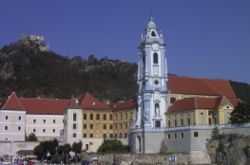Dürnstein
| Dürnstein | ||
|---|---|---|
 | ||
| ||
 Dürnstein | ||
| Coordinates: 48°23′44″N 15°31′13″E / 48.39556°N 15.52028°ECoordinates: 48°23′44″N 15°31′13″E / 48.39556°N 15.52028°E | ||
| Country | Austria | |
| State | Lower Austria | |
| District | Krems-Land | |
| Government | ||
| • Mayor | Barbara Schwarz (ÖVP) | |
| Area | ||
| • Total | 16.81 km2 (6.49 sq mi) | |
| Elevation | 209 m (686 ft) | |
| Population (1 January 2013)[1] | ||
| • Total | 872 | |
| • Density | 52/km2 (130/sq mi) | |
| Time zone | CET (UTC+1) | |
| • Summer (DST) | CEST (UTC+2) | |
| Postal code | 3601 | |
| Area code | 02711 | |
| Vehicle registration | KR | |
| Website | www.duernstein.at | |
Dürnstein is a small town on the Danube river in the Krems-Land district, in the Austrian state of Lower Austria. It is one of the most visited tourist destinations in the Wachau region and also a well-known wine growing area. The municipality consists of the Katastralgemeinden Dürnstein, Oberloiben and Unterloiben.
Etymology
The town gained its name from the medieval castle, Burgruine Dürnstein, which overlooked it. The castle was called "Duerrstein" or "Dürrstein", from the German duerr/dürr meaning "dry" and Stein, "stone". The castle was dry because it was situated on a rocky hill, high above the damp conditions of the Danube at the base of the hill, and it was built of stone.
History

Dürnstein was first mentioned in 1192, when, in the castle above the town, King Richard I Lionheart of England was held captive by Duke Leopold V of Austria after their dispute during the Third Crusade. Richard had personally offended Leopold by casting down his standard from the walls at the Battle of Acre, and the duke suspected that King Richard ordered the murder of his cousin Conrad of Montferrat in Jerusalem. In consequence Pope Celestine III excommunicated Leopold for capturing a fellow crusader. The duke finally gave the custody of Richard to Emperor Henry VI, who imprisoned Richard at Trifels Castle. Dürnstein Castle was almost completely destroyed by the troops of the Swedish Empire under Field Marshal Lennart Torstenson in 1645.
Dürnstein Abbey (Stift Dürnstein) was established in 1410 by Canons Regular from Třeboň and from 1710 rebuilt in a Baroque style according to plans by Joseph Munggenast, Jakob Prandtauer and Matthias Steinl. The monastery was dissolved by order of Emperor Joseph II in 1788 and fell to the Herzogenburg Priory.
During the War of the Third Coalition the Battle of Dürenstein was fought nearby on November 11, 1805.

Politics
Seats in the municipal assembly as of 2005 elections:
International relations
Dürnstein is twinned with:
References
| Wikimedia Commons has media related to Dürnstein. |
